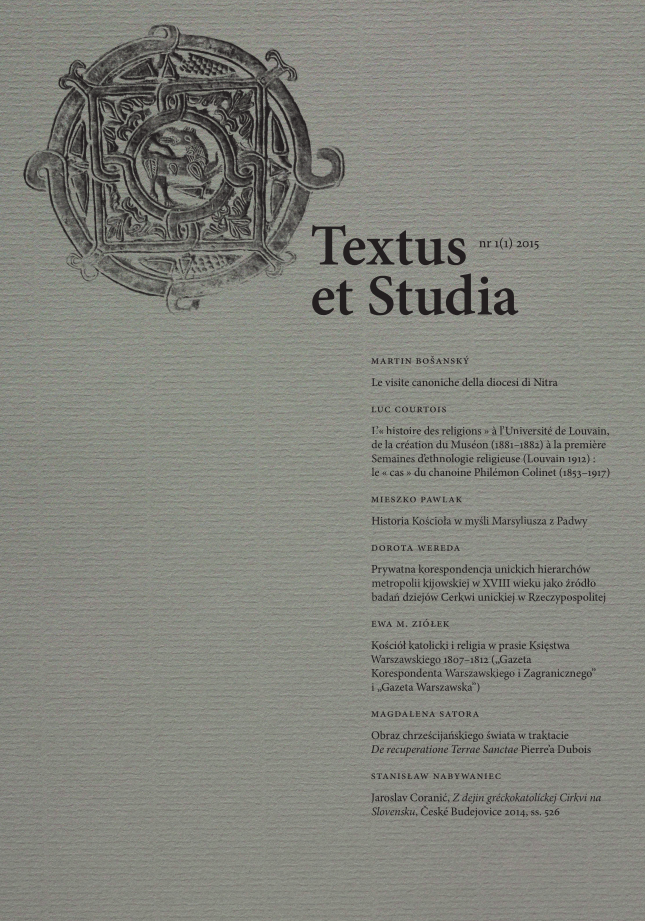Prywatna korespondencja unickich hierarchów metropolii kijowskiej w XVIII wieku jako źródło badań dziejów Cerkwi unickiej w Rzeczypospolitej
DOI:
https://doi.org/10.15633/tes.01104Słowa kluczowe:
Cerkiew unicka, biskupi uniccy, unicka metropolia kijowska, epistolografia XVIII wiekuAbstrakt
Private correspondence of the hierarchs from the metropolis of Kiev in the 18th century as a source for study the history of the Unite Church in the Republic of Poland An important source for researching the history of the Uniate Church in the second half of the 18th century is correspondence exchanged among its hierarchs (Piotr Bielański, Stefan Lewiński, Jason Smogorzewski). Letters were both a form of distance communication and a means of dealing with particular matters. The subject matter most decidedly dealt with was appointment of bishopric hierarchs, both in terms of candidates as well as circumstances. The analysis of these letters shows that the selection of the staffing of bishoprics was perceived as a result of efforts within the circles of the royal court. A lack of qualifications was not an obstacle in assuming the position of a Uniate bishop in the Republic of Polish-Lithuanian Commonwealth. The correspondence shows that the party rigorously standing up for adhering to legal norms in filling the posts was the Holy See, decidedly rejecting solutions not justified by the law and having a temporary nature.
The contents of the letters illustrates the Uniate Church hierarchs’ confusion, lost between tradition and modernity. An example being the Lewiński’s reference to a custom not used for a long time, practised in the Uniate Church, of summoning Uniate hierarchs to an election meeting in order to elect the Metropolitan Bishop. The contents of the correspondence between Uniate hierarchs expresses numerous doubts related to legal background of activities carried out by the Uniate Church and a lack of clear guidelines. These letters illustrate transformations of bishops’ attitudes in the face of a choice between their own tradition, whose knowledge was sometimes unsatisfactory, and adopting solutions related to changes caused by the spread of new ideas of the Renaissance and adapting to current changes in the social and political life, e.g. changes in the calendar leading to a decreased number of holidays and unification of the Liturgy calendar with the Gregorian calendar. The bishops’ correspondence reflects anxieties of a social nature in Wołyń and Podole during the Great Sejm, in the 19th-century historical writings as ‘the Wołyń fear’. The analysis of the correspondence carried out by the Episcopate of the Kiev Uniate Metropolis shows a huge interest in social and family life by selected representatives of social elites. The ideas which we learn from the correspondence are evidence of the feeling of separateness and own identity of faithful and clergy and hierarchs of the Uniate Church.
Bibliografia
Archiwum Główne Akt Dawnych
Archiwum Radziwiłłów, V, sygn. 735, 5458, 14697.
Archiwum Roskie, Korespondencja IV/12, XXV/37.
Центральний державний історичний архів України у Львові
Fond 201, op. 4b, sygn. 3016.
Fond 684, op. 1, sygn. 1758–1768.
Акты издавемые Виленскою археографическою коммисиею для разбора древних актов, t. 16, Вильна 1889.
Описаніе Документовъ архива Западноруских уніатських митрополитовъ, t. 2, Санкт Петерсбургъ 1907.
Zielińska Z., Poniński Adam [w:] Polski słownik biograficzny, t. 23, Wrocław–Warszawa 1983, s. 504–512.
Pobrania
Opublikowane
Numer
Dział
Licencja
Prawa autorskie (c) 2017 Dorota Wereda

Praca jest udostępniana na licencji Creative Commons Attribution-NonCommercial-NoDerivatives 3.0 Unported License.
Autorzy publikujący w czasopiśmie udzielają jego wydawcy zgody o następującej treści:
- Autor zachowuje autorskie prawa majątkowe do utworu, a jednocześnie udziela wydawcy czasopisma zgody na jego pierwszą publikację w wersji drukowanej i wersji online na licencji Creative Commons Uznanie autorstwa 4.0 Międzynarodowe oraz zgody na wykonywanie opracowań, w tym przekładów.
- Autor ma możliwość udzielania zgody niewyłącznej na opublikowanie utworu w wersji, która ukazała się w czasopiśmie (np. zamieszczenia go w repozytorium instytucjonalnym lub opublikowania w książce), wraz z informacją o jego pierwszej publikacji w czasopiśmie.
- Autor może umieścić swój utwór online (np. w repozytorium instytucjonalnym lub na swojej stronie internetowej) jeszcze przed zgłoszeniem utworu do czasopisma.

